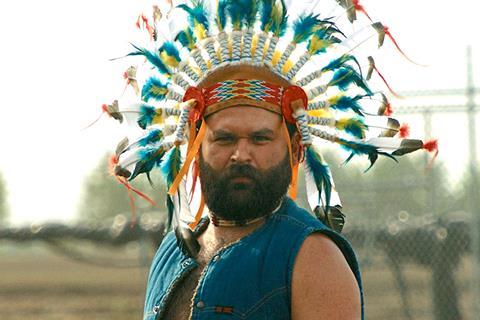
This year’s TIFF line-up reflects an Indigenous film world that is getting bigger and broader all the time. Taking in more than a dozen features, a handful of shorts and a docuseries, Toronto’s Indigenous roster — spread across several festival programmes — “hits a lot of different genres that we don’t normally see in Indigenous films,” says Kelly Boutsalis, the festival’s international programmer for Canada.
And by representing a diversity of content drawn from five continents, the line-up represents something of a landmark, suggests Jason Ryle, TIFF’s international programmer for Indigenous cinema. “This is a year we’ve been waiting for, for so long,” says Ryle, who previously spent a decade as executive director of Indigenous cinema organisation ImagineNATIVE.
The traumas of the colonial past have always been an important subject for Indigenous cinema and they are present in this year’s selections. But in titles such as James Burns and Stevie Salas’s documentary Boil Alertand Carol Kunnuk and Lucy Tulugarjuk’s Inuktitut-language drama What We See (Tautuktavuk), both from Canada, the colonial past, says Boutsalis, “is not the whole story, it’s an element”.
Romance is a less familiar subject in Indigenous cinema, but Ryle argues that films such as Sara Margrethe Oskal’s The Tundra Within Me (Eallogierdu), set in Norway’s Sámi community, show filmmakers are broadening their palettes. The movie, says Ryle, uses “a core aspect of Sámi culture — reindeer herding — as the backdrop for a love story.”
After the local screen success of US series Reservation Dogs, Indigenous comedies have also become more visible and the TIFF roster includes Taika Waititi’s American Samoa-set Next Goal Wins and Hey, Viktor!, Cody Lightning’s Canadian mockumentary riff on 1998 Indigenous cinema landmark Smoke Signals.
Indigenous people “have a very strong sense of humour”, Boutsalis points out. “It’s always been there, but because of the success of Reservation Dogs we’ve been able to see other forms of humour in film.”
Also notable is the diversity of regions from which TIFF’s collection originates. Along with Canadian features, four films from or about Australia and New Zealand are screening. These include The New Boy, Warwick Thornton’s Australian period drama with Cate Blanchett, and historical epic The Convert from New Zealand’s Lee Tamahori.
From the Sámi communities of Scandinavia come three features, including Katja Gauriloff’s Je’vida, the first feature shot in the Skolt Sámi language. Ryle says the size of the Sámi contingent is the result of two decades of lobbying by the Norway-based International Sámi Film Institute, and he sees the communities as the “next hotbed” in global Indigenous cinema.
Latin America — where Ryle says some countries are “finally turning their attention to the talent which exists within Indigenous communities” — is represented by features including Felipe Galvez Haberle’s anti-colonialist western The Settlers, just named as Chile’s submission for the international feature Oscar, and Mixtec drama Valentina Or The Serenity from Angeles Cruz.
Game-changer
From the US comes Billy Luther’s Navajo Nation-set Frybread Face And Me, a coming-of-age tale with Waititi serving as executive producer. While the US has lagged behind in providing financial support for Indigenous filmmaking, Waititi’s success, and the popularity of Reservation Dogs, has been “a massive gamechanger”, says Ryle. Hollywood is now “looking at Indigenous stories in a very different way”, he believes.
Both TIFF programmers, in fact, suggest that Indigenous cinema in America and other continents is not just healthy but poised for a future as part of the mainstream. Boutsalis says she hopes there is “finally an understanding” that Indigenous writers, directors, producers and actors “have something of value to give to all audiences, beyond just Indigenous audiences”.
Ryle looks forward to a day when the ‘Indigenous film’ label “becomes an umbrella term, like ‘European cinema’”. Then, he suggests, more individual filmmakers will be recognised in their own right, as Waititi is. “Often there’s a pressure for a filmmaker to represent the totality of their nation,” says Ryle, “whereas they should just be creating their own work.”















![[L-R]: Amanda Villavieja, Laia Casanovas, Yasmina Praderas](https://d1nslcd7m2225b.cloudfront.net/Pictures/274x183/6/4/1/1471641_pxl_20251224_103354743_618426_crop.jpg)









No comments yet